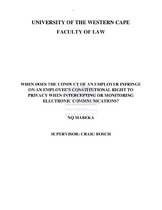| dc.contributor.advisor | Bosch, Craig | |
| dc.contributor.author | Mabeka, Nombulelo Queen | |
| dc.contributor.other | NULL | |
| dc.contributor.other | Faculty of Law | |
| dc.date.accessioned | 2013-10-24T09:49:49Z | |
| dc.date.available | 2009/10/05 12:21 | |
| dc.date.available | 2009/10/05 | |
| dc.date.available | 2013-10-24T09:49:49Z | |
| dc.date.issued | 2008 | |
| dc.identifier.uri | http://hdl.handle.net/11394/2353 | |
| dc.description | Magister Legum - LLM | en_US |
| dc.description.abstract | The Regulation of Interception of Communications and Provision of Communication Related Information Act 70 of 2002 (RICA) that regulates the monitoring of electronic communications has not yet been tested by our courts. This paper explores the likelihood of an infringement of an employee's right to privacy by an employer in the process of intercepting the latters electronic communications. It is argued that there is no explicit provision of the protection of the right to privacy that is provided in the LRA. It is further argued that the provisions of section 4, 5 and 6 of RICA as they stand do not necessarily provide for the protection of an employee's right to privacy, but the incorporation of these sections could be construed as meaning that the legislature or the framers of the legislation intended to limit the employers right to trade freely, at the same breath, limit the employees right to privacy. It is argued that RICA does not provide protection for the right to privacy wherein consent has been obtained under duress or based on misrepresentation of facts. It is contended that the interception of employees electronic communications in such circumstances would be regarded as an infringement of such employees right to privacy. The burden of proving duress or misrepresentation of facts rests on the employee who alleges that such consent was obtained under duress or based on misrepresentation of facts. It is also argued that RICA does not define the meaning of the words in the course of carrying on of business or reasonable steps provided in section 6 of RICA. It is argued that the meaning of in the course of carrying on of business would be determined by the type of the industry upon which the business operates, as well as the circumstances of the case. Reasonable steps would be regarded as being taken if employers notify employees that their electronic communications would be intercepted. | en_US |
| dc.language.iso | en | en_US |
| dc.publisher | University of the Western Cape | en_US |
| dc.subject | Telecommunications | en_US |
| dc.subject | Law and legislation | en_US |
| dc.subject | South Africa | en_US |
| dc.subject | Computer communications | en_US |
| dc.subject | Law | en_US |
| dc.title | When does the conduct of an employer infringe on an employee's constitutional right to privacy when intercepting or monitoring electronic communications? | en_US |
| dc.type | Thesis | en_US |
| dc.rights.holder | University of the Western Cape | en_US |
| dc.description.country | South Africa | |

